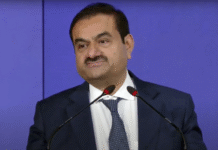New Delhi- President Pranab Mukherjee on Thursday gave his assent to the landmark Goods and Services Tax (GST) Bill, an official said.
The President’s Office confirmed the development to IANS.
The central government had sent the Constitutional Amendment Bill to the President after 16 states ratified the legislation.
The government targets to implement the GST system from April 1, 2017. The Centre will have to pass the Central GST and Integrated GST Bills, while the states will need to approve their respective GST legislations.
The Bill was earlier passed unanimously by the Rajya Sabha and the Lok Sabha.
The Goods and Services Tax is a single indirect tax that proposes to subsume most central and state taxes like Value Added Tax, service tax, central sales tax, excise duty, additional customs duty and special additional customs duty.
The GST rate has to be decided by the proposed GST Council, which will be chaired by the Union Finance Minister. All state finance ministers will be its members.
The Council also has to put in place a dispute resolution mechanism.
The states will, however, be able to adopt a GST structure that is different from that recommended by the GST Council. The council recommendations will not be binding on the states.
The Bill says the GST Council will make recommendations to the Centre and the states on issues such as taxes, cess and surcharges that might be subsumed in the GST tax rate. Parliament and state assemblies have the right to accept those recommendations in their GST Bills.
While the pan-India overhaul of India’s indirect tax regime has got the mandatory support of more than half the states, Tamil Nadu’s ruling AIADMK had walked out before the voting on the Bill began, both in the Rajya Sabha and the Lok Sabha.
The party had wanted some changes in the Bill, such as imposition of four per cent additional tax on inter-state trade and transfer of money thus collected to the state of origin of the goods.
The Centre is to compensate the states for revenue losses for the first five years after the implementation of the GST if the states’ revenues come down under the new tax regime.
Meanwhile, at a meeting here with the Empowered Committee of State Finance Ministers on GST last month, India Inc pitched for an 18 per cent standard rate on the ground that this rate will generate adequate tax buoyancy without fuelling inflation.
The opposition Congress had earlier demanded an 18 per cent cap on the GST rate.
The Federation of Indian Chambers of Commerce and Industry (Ficci) suggested that to check inflation and the tendency to evade taxes “the merit rate should be lower and the standard rate reasonable”.
“As per the current indications and reports, goods will be categorised as being subject to merit rates (12 per cent), standard rates (18 per cent) and de-merit rates (40 per cent),” Ficci said in a release following a meeting here with the Empowered Committee.
“Certain goods will be exempted from the GST while bullion and jewellery will be charged at one-two per cent,” it said regarding classification of goods for applying GST rates.
On the implementing of GST, Ficci said that in order to provide adequate time to trade and industry to prepare “for a hassle-free rollout of the GST regime”, a minimum of six months should be permitted from the date of the adoption of the GST law by the GST Council.
“Additional time would be required in case the GST law as passed by Parliament or state legislatures is significantly different from the one adopted by the GST Council,” the statement added.
In a meeting here with Revenue Secretary Hasmukh Adhia last month, industry chambers had expressed concerns about the draft GST law, flagging issues like dual administrative control and wide discretionary powers for tax authorities.






